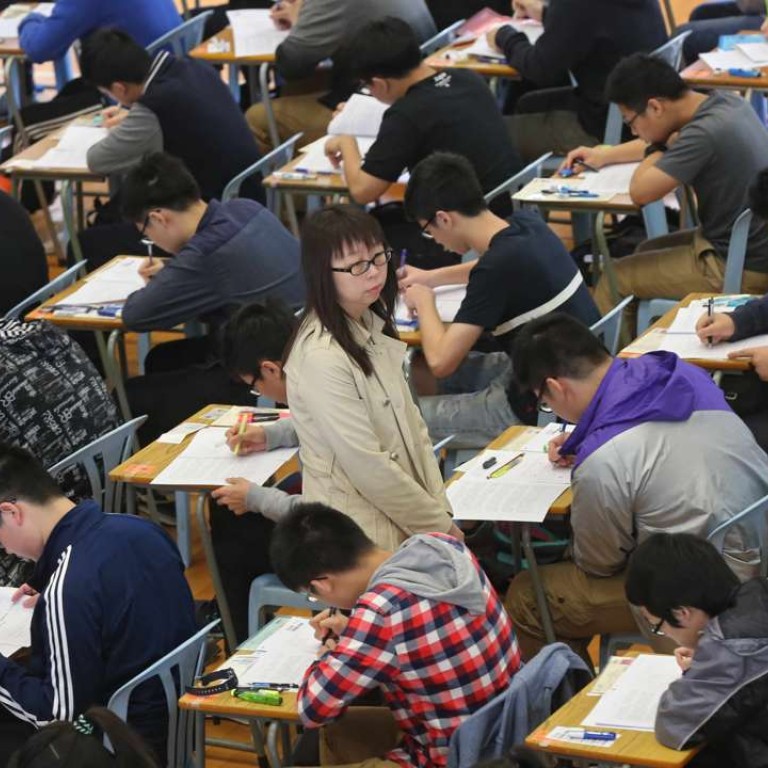
Letters to the Editor, March 14, 2017
Primary school students will snub new test
The Education Bureau wants primary school students to take the new competence exam which is going to replace the controversial Territory-wide System Assessment.
However, some schools are reluctant to carry out the new Basic Competency Assessment (BCA), because it is felt that children already do a lot of homework and tests, and are often under too much pressure.
The high suicide rate among young students in Hong Kong is a cause for concern, and it is not just secondary students who take this drastic step, but also primary-age pupils.
Young people should go to school to acquire knowledge and prepare themselves for the adult world. The local education system should be organised so they have enough time at weekends and during holidays to rest, hang out with friends and do the things that interest them.
Instead, many have to do additional homework and quizzes, leaving them hating their studies.
I believe that primary students will want nothing to do with the BCA and would like education officials to scrap it.
Susanne Ma Suet-sin, Yau Yat Chuen
Time for HK to think about labour imports
This is partly due to the fact that the wages for construction workers can often be almost as high as those for many ordinary office employees.
Many young Hongkongers have received a higher level of education than previous generations, and fewer are now willing to take a job as a construction worker, leading to a labour shortage.
Moreover, youngsters are put off by the relatively tough environment of a construction site. They would rather continue their education after school and look for better career options.
I hope more young people will think again about joining the construction sector and consider what it can offer them as a career choice.
Also, the government has to now think about importing more construction workers to make up for the shortage.
Leung Yi-ling, Yau Yat Chuen
Backward move in city on electric cars
They are much more eco-friendly than petrol cars, as there are no emissions. Some people say that power stations in Hong Kong are coal-fired and so cars that use electricity are bad for the environment. But we also use electricity generated by the nuclear plant in Daya Bay.
I think the old methods of using fossil fuels will slowly be replaced by cleaner technology, not just nuclear power.
We will gradually see the expansion of renewable energy. So, I cannot agree with people who say that e-vehicles pollute.
It is a shame the government decided to cap the first registration tax waiver for electric private cars at HK$97,500.
This will raise the price of these vehicles and discourage prospective buyers. Given that these cars will the main mode of transport worldwide in 20 years, I do not understand why the government does not support their increased use.
Beatrice Chan, Kwai Chung
Divided society long way from being healed
I believe we should all care about the chief executive election on March 26, and think carefully about all three candidates – Carrie Lam Cheng Yuet-ngor, John Tsang Chun-wah and Woo Kwok-hing. This election relates to all of us.
The new leader will have an important role to play. However, it seems that no matter who is elected, the conflicts that exists in Hong Kong will continue.
This is because our society is polarised, with people expressing wildly divergent views.
It saddens me that Hong Kong society seems to be tearing itself apart and it is a very serious issue. Citizens need to try harder to communicate with each other and resolve differences.
I hope we can develop an election system that will eventually meet the needs of everyone in society.
Ellie Leung, Tsuen Wan
Food trucks are failing to meet objectives
I do not think the food trucks have achieved their original goals, which were to offer creative and high-quality delicacies to tourists that are not available in ordinary restaurants.
Many of the trucks are selling traditional Hong Kong snacks such as fish balls and siu mai, but at relatively high prices. This is because operators have had to spend quite a lot on the trucks.
Tourists clearly want to eat the local snacks, but having the food trucks sell them can hardly be described as creative, since these dishes are common in many local restaurants.
Also, when the trucks are busy, there can be long queues, as some dishes can take some time to prepare.
I think the government must review this two-year pilot scheme. The trucks are facing more problems than anticipated, and so rents should come down as well. This may encourage operators to try and spend more on innovative delicacies. They also should be allowed more mobility, which can help increase profits, and help them achieve their original goals.
Natalie Siu Hoi-tung, Yau Yat Chuen

